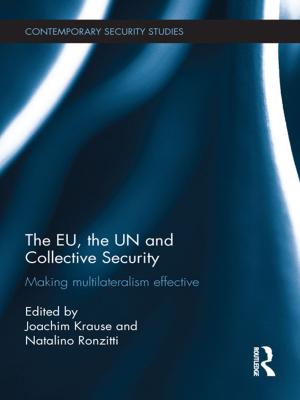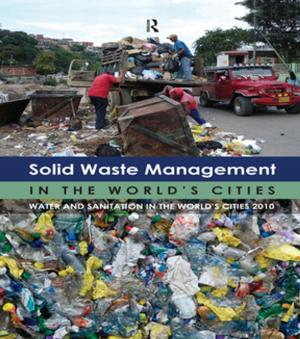Beyond Global Crisis
Remedies and Road Maps by Daisaku Ikeda and His Contemporaries
Nonfiction, Social & Cultural Studies, Political Science| Author: | Terrence Edward Paupp | ISBN: | 9781351313940 |
| Publisher: | Taylor and Francis | Publication: | September 29, 2017 |
| Imprint: | Routledge | Language: | English |
| Author: | Terrence Edward Paupp |
| ISBN: | 9781351313940 |
| Publisher: | Taylor and Francis |
| Publication: | September 29, 2017 |
| Imprint: | Routledge |
| Language: | English |
In this volume, Terrence Paupp critically describes the various dimensions of today's global crisis. Among other things, this volume analyzes nuclear weapons proliferation climate change, and international lawlessness in the form of wars of aggression. Paupp argues that much human conflict and environmental degradation is the direct consequence of poverty and inequality. Until these issues are addressed, many of the world's problems will remain.
Paupp asserts that around the world, peoples and nations are becoming more open to a strategy and culture of peace that evolves through discovering a commonality of interests, the value of mutual cooperation, and the desirability of forging consensus. By using various road maps and remedies supplied by noted Japanese peace activist Daisaku Ikeda and his contemporaries, viable solutions will emerge.
In this new endeavor, equipped with some of the proposed solutions and strategies that this book provides, humanity will collectively become engaged in remaking the character of global governance in order to build a global culture of peace.
In this volume, Terrence Paupp critically describes the various dimensions of today's global crisis. Among other things, this volume analyzes nuclear weapons proliferation climate change, and international lawlessness in the form of wars of aggression. Paupp argues that much human conflict and environmental degradation is the direct consequence of poverty and inequality. Until these issues are addressed, many of the world's problems will remain.
Paupp asserts that around the world, peoples and nations are becoming more open to a strategy and culture of peace that evolves through discovering a commonality of interests, the value of mutual cooperation, and the desirability of forging consensus. By using various road maps and remedies supplied by noted Japanese peace activist Daisaku Ikeda and his contemporaries, viable solutions will emerge.
In this new endeavor, equipped with some of the proposed solutions and strategies that this book provides, humanity will collectively become engaged in remaking the character of global governance in order to build a global culture of peace.















